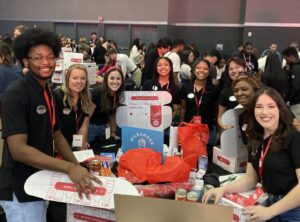Inclusivity is what we all need to thrive for, and workplace diversity in hiring is an increasingly hot topic for the recruitment industry. The latest data found that only 17% of UK companies have a high representation of both women and ethnic minorities.
A diverse workforce can bring many benefits: those with a strong percentage of ethnic minority employees are 33% to 36% more likely to outperform their competition.
Advocates also cite increased creativity, different perspectives, and a wider talent pool to choose from amidst skills shortages.
Recruitment software experts, Occupop, share the importance of diverse recruitment and outline what traits you should look for in a candidate to level up your recruitment.
What traits should you look for during the hiring process?
Race, gender, or any other defining characteristic should obviously never be used as determining factors in the recruitment process. But what factors may hint at a candidate’s competency and suitability for the role?
Soft skills – such as organisation, communication and time management – are more in demand than ever and, remarkably, featured in 78% of all job descriptions over a three-month period in 2022.
Organisational skills are crucial to any role, with the well-organised candidate able to manage the workload effectively, prioritise tasks and meet deadlines. Assess this during an interview by checking that the candidate has researched your organisation thoroughly and has read the job description and criteria.
Clarity of tone is particularly important in communication-heavy roles and can be the backbone of collaboration and teamwork. Look out for confident body language, and asking open-ended questions can help you assess their communicative powers.
Finally, the interview process should also lend insight into your candidate’s time-management skills. Ideally, your candidate should be early, well-presented and prepared. Running late to an interview never makes a good impression and could suggest they’re disinterested in the role or disorganised.
Create workplace diversity in hiring with an ATS system
While critics may say applicant tracking systems (ATS) lack the personal touch, an ATS can objectively evaluate applicants, removing any unconscious biases.
One of the fundamental benefits of applicant tracking systems is that candidates are evaluated solely on their qualifications, skills and experience as opposed to external factors such as race or gender.
Applicant Tracking Systems can effectively create a level playing field where all candidates have an equal opportunity to showcase their respective talents.
Commenting on the importance of creating workplace diversity, Caroline Gleeson, CEO of Occupop said:
“Building an inclusive workforce is not just about ticking boxes; it’s a strategic imperative for businesses to thrive in today’s competitive landscape. Embracing diversity brings a wealth of perspectives, experiences, and talents to the table, fostering innovation and driving better outcomes.
“At Occupop, we believe that by leveraging technology like ATS systems to focus on qualifications and skills, we can create a level playing field for all candidates, breaking down barriers and unlocking the true potential of a diverse talent pool.”
Cast a wider net
Key to establishing a more inclusive and diverse workforce may be searching for talent across all areas of the country – North, East, South and West. This can ensure you attract more classes, creeds and ethnicities.
Your applicant screening process can help you here. When shortlisting, take time to review the geographical spread of your candidates. Is it best to hold interviews from one central location, or is your organisation expansive enough to interview across multiple?
Further, could you consider remote options for your first round of interviews? Long, expensive train rides may dissuade candidates from poorer economic backgrounds.
Paid internships
Legally, if interns are promised a contract for future work, then they are entitled to National Minimum Wage.
Unpaid internships will also likely exclude those without the necessary proximity or resource, which will narrow your talent pool.
Interns shouldn’t be expected to completely cover their own expenses and accommodation, particularly during a cost-of-living crunch.
Clearly, much more is needed to be done to ensure the UK workforce is truly representative. A more diverse team can be the key to a better culture, better problem solving, and better profit. Employ these top tips to attract and recruit a wider range of talent.
Sources
Race in the UK workplace: The intersectional experience | McKinsey















